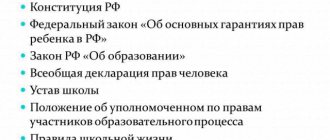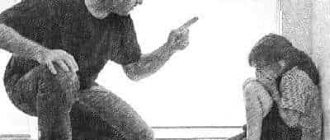Giving a slap in the face, putting him in a corner “on buckwheat” or giving him a belt are ancient methods of education that are widely used by parents to this day. Physical education measures in many families are considered something of a norm: “what’s wrong with this, they gave me a belt and everything is fine with me.”
At the same time, more and more often in the media, on television news, we see stories about unfortunate parents who maim or even kill their children using such methods of education.
The law in such cases is not clear, because according to the already adopted decriminalization, beatings in the family no longer faces criminal liability - such a person is brought to administrative responsibility:
“If the fact of physical impact on a child, which did not cause deterioration in health, is recorded again, and there are witnesses to this, the parents (or his official representatives) will be held administratively liable.”
In this case, the law provides for a fine of up to 30,000 rubles, administrative arrest for up to 30 days, or community service.
There is a somewhat ambiguous point in this interpretation of physical impact on a child: in the absence of deterioration in physical health. That is, if after a regular “belt on the butt” the child does not become disabled, the parents will not bear responsibility for this as such.
The consequences of even one blow for a child often cause the following:
- The child does not listen to his parents, but is afraid. Therefore, there is no understanding, fear of one’s own misdeeds begins, hiding information, lying, so that adults do not find out and punish.
- The child becomes withdrawn, aggressive, and adopts the “any problem can be solved with fists” behavior model towards others.
Beating a child is not only a negative physical impact, but also a psychological trauma that can cause quite serious problems in adult life.
Reasons and motives: why do parents beat their children?
The most common thing you hear from such parents is: “I was raised this way as a child.” No matter how paradoxical it may sound, for many it is already a kind of family tradition to pass on such methods of raising a child by inheritance.
In fact, the reason is different: the mother or father is simply not competent enough in upbringing, they do not have the ability to normally come to an agreement with the child and solve the problem, and the use of force is something where a lot of intelligence is not needed - for that the child will immediately understand and do more will not be. But, in this case, the parent does not think about why it won’t happen (if so) - the child will not understand his offense, but will simply be afraid. And in this case we are not talking about education at all.
The use of physical violence against children of primary preschool and school age occurs much more often than against older children. This is due to the fact that at this age the child is unlikely to complain to any of the strangers and parents, naturally, nothing will happen for this. Bruises and abrasions can easily be attributed to the fact that the child fell himself, got into a fight, was injured while playing on the street, and so on.
Have a question for a lawyer? Ask now, call and get a free consultation from leading lawyers in your city. We will answer your questions quickly and try to help with your specific case.
Telephone in Moscow and the Moscow region: +7
Phone in St. Petersburg and Leningrad region: +7
Free hotline throughout Russia: 8 (800) 301-39-20
At school age, a child often already realizes that he has someone to ask for protection. In addition, adults can also pay attention to the presence of physical injuries: teachers, parents of other children, and classmates themselves can tell their parents or teachers about it.
Choice of punishment
There are articles for beating citizens, including minors, in the Code of Administrative Offenses of the Russian Federation and in the Criminal Code of the Russian Federation. Administrative punishment is imposed if the beating does not contain signs of a criminal offense. These include:
- hooligan urges;
- motive of hatred towards a particular race, nationality, religious or social group.
Note!
A crime is considered committed out of hooligan motives if harm is caused to a person intentionally without any reason.
The court will determine who provoked the conflict, what was the reason for the beating, whether the victim was the instigator, and whether he committed illegal actions. If the culprit of the fight is a minor, his offenders will not face punishment for beating minors under the article of the Criminal Code of the Russian Federation.
Right to defense
A child of any age has the right to protection. The following may file a complaint with the police and the guardianship and trusteeship authority that unacceptable educational measures are being applied to a child:
- teachers: teachers in school and out-of-school educational institutions, educators in kindergartens;
- random witnesses;
- neighbours;
- social service workers.
Any citizen who has witnessed the beating of a child has every right to report this to the competent authorities.
Beating of minors: difficulties of qualification and legal assessment
Illegal actions by adults or peers against minors have a socio-psychological basis. But the complexity of a crime in the legal system lies not only in this moment. Statistics show a large number of latent crimes. At the same time, within the framework of family education, beating is considered by parents as an element of punishment for misconduct.
When investigating and establishing punishment within the framework of Article 116 of the criminal law, a number of shortcomings are allowed:
- during the investigation, the requirements of the law for a comprehensive and objective consideration of events are not always fully met;
- Court authorities do not always take into account all the procedural subtleties of considering complaints related to such events.
The actions of third parties and peers in relation to adolescents have a special composition.
What is the penalty for beating?
If the fact of assault, but without damage to the child’s health, is recorded for the first time, then it is likely that the parents will get off with just a preventive conversation. A repeated crime of this nature, and especially with witnesses, already threatens with administrative liability:
- a fine of up to 30,000 rubles;
- public Works;
- administrative arrest.
If the beatings are systematic and leave marks on the child’s body, then we need to talk about a criminal offense.
In addition to all this, the guardianship and trusteeship authorities are also involved in the work: such a family must be registered and monitor everything that happens there. It is likely that things may come to the deprivation of parental rights or the removal of children from the family for a while - until the parents are re-educated.
Legislative framework: on a criminal offense
Thus, beating a child by a parent can be considered a criminal offense under the following articles:
- Article 112 of the Criminal Code of the Russian Federation - up to 5 years of imprisonment if the beatings were inflicted on a minor or minor child;
- Article 116 of the Criminal Code of the Russian Federation – battery with grievous bodily harm;
- Article 117 of the Criminal Code of the Russian Federation – systematic beating of a child.
Serious bodily harm to a child can lead to 10 years in prison. And the fact that such measures are being taken by the parent only aggravates the latter’s situation.
In addition to the fact that a parent can be prosecuted for battery, an additional punishment will also be imposed under the article for cruelty to children (Article 156 of the Criminal Code of the Russian Federation).
Responsibility measures
Due to the age limitation of the articles of the Criminal Code, under which a person or group of persons can be held accountable for beating a minor, the penalties applied are assigned from the same ranges, but for persons under eighteen years of age, the degree of punishment imposed is milder than for adults, despite using the same limits.
If we are talking about the application of the provisions of Article 116 of the Criminal Code of the Russian Federation to determine punishment, then there is no distinction in it as to who committed the crime and against whom , that is, for all persons who committed beatings, the same types of punishments are used , namely:
- compulsory labor with a maximum sentence of up to three hundred and sixty hours;
- correctional labor with a maximum duration of punishment of up to one year;
- restriction of freedom with a maximum limit of two years;
- forced labor for a maximum period of no more than two years;
- arrest with a term of imprisonment of up to six months;
- imprisonment for up to two years.
If we are talking about causing serious harm to the health of a minor, then the punishment is established in accordance with the provisions of Part 2 of Article 111 of the Criminal Code of the Russian Federation within the limits of:
- imprisonment with a maximum sentence of ten years in prison;
- with the possibility of imposing an additional punishment in the form of restriction of freedom for up to two years (appointed as an additional punishment at the discretion of the court).
If the harm caused to the health of a minor is assessed as harm of moderate severity, then such a crime is punishable by imprisonment with a maximum term of imprisonment of no more than five years.
Where to contact?
If you witness a child being beaten, especially if they do it systematically, you should immediately contact:
- territorial police department;
- juvenile affairs inspectorate;
- social service;
- guardianship and trusteeship authority.
Quite often, in addition to beatings, there are other negative impacts on the child in the family: moral, material, and even sexual. Beating of children by parents often occurs against the background of the latter’s antisocial lifestyle: drunkenness, drug use, vagrancy and fraud. Therefore, such actions cannot be ignored. Parents who engage in assault need to realize the following: a child is not a thing or property and, regardless of his age, he must be treated with respect.
Corpus delicti
Depending on the degree of beating and the severity of health damage, the crime will be classified differently. Thus, the article of the Criminal Code of the Russian Federation for beating a minor child, which is used to impose punishment, can vary significantly.
According to legal theory, the corpus delicti consists of:
- The subject of the crime is the person who committed the crime, as well as his special characteristics (position or position due to which the victim becomes dependent on him).
- The object of the crime is not only the personality of the victim, but also the social relations that the criminal encroaches on.
- The objective side is the action/inaction, the connection between them and the consequence, as well as the weapon and method of committing the crime.
- The subjective side includes signs of guilt (intention/negligence), the purpose and motive of the crime, as well as the emotional state of the criminal.
The subject of a crime is considered to be a mentally healthy, sane person who has reached the age of 16 (if a crime is charged under Articles 111-112 of the Criminal Code of Russia - grievous bodily harm, then liability begins at the age of 14).
That is, you do not have to be an adult to receive the proper sentence. All crimes related to battery are classified as crimes against life and health, therefore, in this case, regardless of the classification of the crime under a specific article, the object is health.
The objective side is unlawful infliction of harm to health. Harm may involve disruption of the integrity of organs or their physiological functions. The severity of the harm is determined by an expert examination. Signs of violations are listed in the articles of the Criminal Code, which makes it possible to divide them according to severity.
The subjective side is characterized by intent. In other words, the person understood that certain consequences would occur as a result of his actions and desired them to occur. We are talking about unspecified intent, since in most cases the offender has no idea what kind of damage may occur as a result of the beating. That is, he does not understand how much he needs to hit to cause a certain amount of damage . The goals and motive of the attacker matter in aggravating the responsibility. All this is clarified during the investigation.
Causing harm by negligence is a separate article of the Criminal Code and has nothing to do with beating.
Sanction under the Code of Administrative Offenses of the Russian Federation
Article 6.1.1 provides for liability for beating a person, including a minor. It talks about punishment for beatings. The attacker faces a fine of 5 to 30 thousand rubles, arrest for up to 15 days or compulsory work for up to 120 hours.
Do you have any questions?
To get the most detailed advice on your issue, you just need to follow any of the suggested options:
- Request a consultation using the form
on our website - Or just call the number: 8 800 350-83-74








